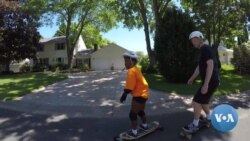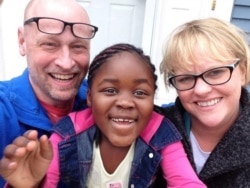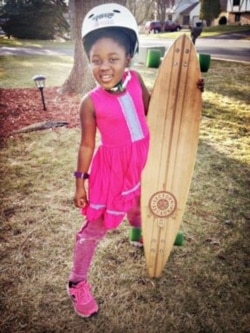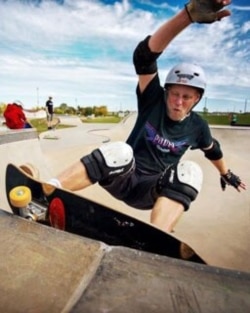Motion has been a constant in Steve Pederson's bond with his daughter, Monique, from her voyage to the United States from Africa as a baby to a shared passion for skateboarding.
Pederson, 56, has never feared embarking on a new path or retracing an old one. He left a long career as an art director in advertising to work with autistic children. He also returned to skateboarding as an adult, winning competitions 20 years after giving it up as a teenager.
And now Pederson is passing that passion to his daughter, Monique. When she was two, he stood her up on a skateboard. A couple years later she was doing it on her own.
“I was never pushing it on her… I don’t want to be one of those dads who pushed skateboarding on his daughter,” Pederson said recently in a Zoom interview from his home in Arden Hills, a suburb of St. Paul, Minnesota.
Adoption process
Nearly eight years ago, Pederson and his wife, Melissa, decided to have a family. They researched adoption and came across an agency in Colorado that had a program adopting children from the Democratic Republic of Congo in central Africa. They were told the wait to adopt in the DRC was shorter than in other countries.
“She looked like a little sweetheart,” he said, recalling the first images they saw of Monique, whose birth mother had severe scoliosis and was not able to care for her. During the wait, the Pedersons sent boxes of clothes to Monique and the other children in the orphanage.
Melissa made the trip to the DRC with other adoptive moms. They waited in the capital, Kinshasa, while Monique, then 16 months old, and the other kids were bused 1,300 kilometers from their orphanage.
Adoptive mother and daughter made the 12,000-kilometer trip to Minneapolis. Steve met them at the airport. “I was excited…gave her a big hug,” he recalled.
The first three days at home were difficult. “She was sad and appeared apprehensive,” he said. “I would show her pictures of the orphanage and she would smile and then get sad. She wasn’t talking much…After three days, something clicked and she was happy and she’s been happy ever since.”
Skateboarding bond
Skateboarding is an element of that happiness that continues to this day.
“It feels like I have a connection with my parents” through skateboarding, Monique, now nine, said. “I like doing it with my dad. I like skateboarding. It’s really fun. You can get outside. I feel relaxed and calm and happy. Whenever I’m doing it with my dad, it helps me work out my wiggles [restlessness].”
That is particularly true for the third grader with ADHD (Attention Deficit Hyperactivity Disorder), who, like students across the country, has been learning from home since March amid the coronavirus pandemic.
A video shot soon after the interview shows a determined and focused Monique skateboarding back and forth down a slight hill near her house in the same way her dad has done for years in competitive skateboarding in the United States, Canada and even in Europe.
It started for Pederson when he was a couple years older than Monique is now. He was on vacation with his family in California in the 1970s when he bought a skateboard at a variety store. He put it on the ground in the parking lot of the hotel where his family was staying - and away he went despite the pleadings of a security guard, he recalled.
He participated in local races in the Minneapolis-St. Paul area but gave up competitive skateboarding after graduating high school in the early 80s.
Pederson earned arts and photography degrees and went on to become an art director at a Minneapolis advertising agency in 1997.
But the lure of skateboarding was never far away. He and Melissa were living in downtown Minneapolis by 2002 and Pederson would skateboard to work.
“About 2006 I was out skateboarding and met a guy who pulled out a racing board,” a longer version of the skateboard used in competitive racing, Pederson recalled. “He had been to some races and he got me interested in racing again. He retaught me how to do it and told me about races going on around the country and the world.”
Adrenaline rush
His passion rekindled, Pederson traveled the country from coast to coast from 2009 to 2015, entering competitive races that are set up like downhill ski slalom courses. He raced in Ottawa, Canada, and Dusseldorf, Germany, in what is called the “Pro Division,” against skaters of all ages. He won a 2012 competition and also had several second and third-place finishes.
“I’m not the best racer and I’m not the worst,” Pederson said modestly. “It is an adrenaline rush. It’s fun. And you develop a camaraderie with all the guys. You see them when you travel. I made friends with people from lots of countries including Germany, France, Sweden, Japan and Brazil. Racing breaks down cultural barriers.”
While racing was his passion and provided him with the challenges he sought, Pederson said he was burned out after two decades in the advertising business. He needed a change and spotted an opportunity.
Working in downtown Minneapolis, he would see blind people and wondered about jobs helping the disabled. One day, while volunteering at Monique’s kindergarten class, he heard about a job working with autistic children at a Minneapolis nonprofit called Fraser. He got the job and has been there for the past 2.5 years.
Treasured moments
While Pederson says he is more fulfilled at work, Monique treasures time spent skateboarding with her dad. “It is something where we can get out of the house and have fun,” she said, so long as her father’s coaching instinct doesn’t become too overbearing.
“[S]ometimes he tells me too much when I’m skateboarding. Sometimes it’s a 20-minute lecture,” she said, imitating Steve’s instruction. He, meanwhile, recalls her falling and scraping her elbow one summer, calling it “a beginner’s mistake.”
They don’t rule out competing together one day. “I would love for her to see me compete, it would be fun,” he said. “I would like to see her get skills so she could compete.”
For Monique, any organized competition would be “97 percent for fun and a little bit competitive.” If they both won their respective races, she joked that she would “steal his trophy.”








